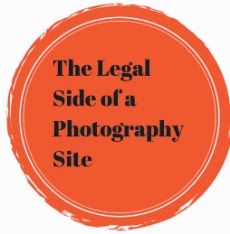My content is reader-supported by awesome people like you. Which means I could earn a commission. Learn more here!

However, running a legit photography website means that you also have to consider formation and taxes.
By setting up your photography business for success, you’ll be better suited to continue that success and build your site legally.
For Photographers Just Starting Out
If you’ve decided to open your business, you need to get all of your legal stuff out of the way. You should look at business structures, taxes, and licenses.
You may need to contact your local small business agency to inquire about licenses for photographers and your new business.
They can offer small businesses and start-ups a wealth of information.
Choose a Business Structure
Multiple business structures are available out there, but there are some more suitable for photographers.
Business structure types include sole proprietor, limited liability company, and corporation.
The type of structure that you choose will depend on the type of business, investment costs, choice of liability and taxes.
Sole Proprietor: These are the most popular for photographers because it’s generally used for small business owners that don’t have a lot of investment capital to work with.
You can create a sole proprietorship by filing a “doing business as” certificate with your county or state.
While this type has the lowest amount of investment cost, you don’t receive any liability protection.
Personal assets are not off limits and not kept separate from business assets either.
If you choose sole proprietorship, you’ll file with a Schedule “C” for taxes along with your personal tax returns.
Limited Liability Company (LLC) – This is another popular structure for photo start-ups.
This structure provides protection for the owner as business and personal assets are not considered together.
LLCs have a bigger monetary investment cost due to Articles of Organization, it’s the most advantageous for online photography businesses because of its liability restrictions and tax limitations.
All LLC earnings are taxed only once because losses, credits, income, and deductions are able to “flow through” to the owner of the company. LLCs are managed by members and income, deductions, credits, and losses, so it’s divided up with the right documentation.
Corporation: These are more popular for more established small businesses with more investment capital.
You need more start-up funds to be a successful corporation. There are also two types of corporations: C and S.
C corporations are subject to double taxation, but this can be avoided if owners of the company only receive a standard and reasonable salary.
S corporation is the more popular of the two for photographers because structure profits don’t have to be evenly distributed, but corporations are subject to state corporate fees.
States also have different laws for business structures. Most business guides suggest that Wisconsin has the best laws regarding LLCs.
How to Pick the Right Business Structure for Photo Sites?
You need to decide what’s most important to you when considering the success of your photography site. These are just a few of the factors:
* Renewals
* Long term goals
* Monetary investment
* Desired protection of assets
If you don’t have a lot of money for start-up costs, the best option would be sole-proprietorship, but if you also want to protect your assets, you’ll need to file as an LLC.
There are also long-term benefits of becoming an LLC. It’s difficult for independent photographers to start corporations on their own.
The Issue of Taxes for Photographers
There are different types of taxes that you’ll need to pay according to where you are operating your site as tax laws vary state by state in regards to digital goods.
There are federal income taxes, state income taxes, and state sales taxes. There are also some miscellaneous taxes that depend on your business formation and are also different based on the jurisdiction.
Federal Income Taxes
You should consider the federal income tax to be all about your income from your photography business.
There isn’t a federal sales tax. You have to file a claim yearly, and you should always save a portion of your profits to pay your taxes as your bill will accrue from the IRS.
You must do your own withholding as the business owner. You may also be able to pay your taxes throughout the year to avoid surprises.
This depends on the type of business and state, so you’ll need to contact the IRS if you want to use this option.
State Income Tax
Additionally, some states also have a state income tax that is just like federal income tax. You’ll have to file your state income tax separately.
State Sales Tax
Most businesses that sell products must collect taxes for your state. However, some states do not require sellers of digital goods to charge any taxes.
You should always apply a state sales tax on top of your digital goods price. You also need to get a sales tax permit, which are free.
You also have to file a sales tax return along with your other tax claims. Local sales and taxes are based upon where you registered your business.
You may also be required to pay sales taxes if you operate as a photographer in other areas. Most photographers selling prints and canvases must charge a sales tax.
If a person is purchasing a download such as a digital wallpaper, then you may not have to charge sales tax.
You’ll have to check with your local tax agency to determine if sales tax applies to digital goods.
Business Forms for Photographers
You’ll need to have these forms on file.
Portrait Agreement
Clients and photographers must enter an agreement called a portrait agreement.
This outlines specifics like payment, cancelation policy, session date and more. If you don’t have this form, the expectations and policies of the relationship can be disputed.
If you don’t use this form, you are placing yourself in danger of being sued if something should go wrong with a photo shoot or portrait for a client.
Model Release
The subject of a photograph must also sign a release. A minor’s parent or guardian must sign this release as well.
The release gives the photographer permission to display the photograph and use for exhibitions or personal uses.
Print Release
Photographers also have to let clients know that they have rights when they download digital files from your site.
You should have detailed restrictions on what can and cannot be done with a digital download.
What privileges do you allow for your stock photos? Clients often want unlimited use, but they may call this copyright ownership.
You must specify that they do not own the copyright, but they may buy a license to use the photos according to your specifications.
You should also understand the different between print and copyright release.
Independent Contractor Agreement
If you plan to partner with others in the photography world or web design world, you’ll likely enter into an independent contractor agreement.
This states what goods or services are to be provided at what salary and often includes a deadline or time sensitive information.
The agreement also needs to state that benefits are not included and that contractors must file their own taxes. You can specify other expectations and policies on the agreement.
Copyright Notice
You must have copyright protection if you plan to run a successful photography site. Most clients do not understand or pay attention to copyright, but that’s all the more reason for you to do so.
If they buy files online, they may just want to use them for print. You should specify what photos can be used for and how often they can be used for as part of the copyright license.
You should also state that copyright laws are in effect whenever clients purchase art or photos from your site.
Talk to A Lawyer
If you are confused about any legal aspects of starting your photography site, you may want to consult with a lawyer on the proper business formation and getting your forms in order to protect your work.
You may need special copyright for your site as well. You can also survey popular photography sites to understand how to set up your copyright and legal protection agreements.
It’s important that you get all of this setup before you start selling any work online.
Starting a photography website is an incredible step forward for photographers.
You are entering the business marketplace and opening up visibility to your work from all over the world.
You must take the proper precautions and always think with copyright in mind when dealing with clients.
Once you have protected yourself, you will have a more legitimate online photography business that can progress your career as well.
Image Credit: My Own Work





Leave a Reply